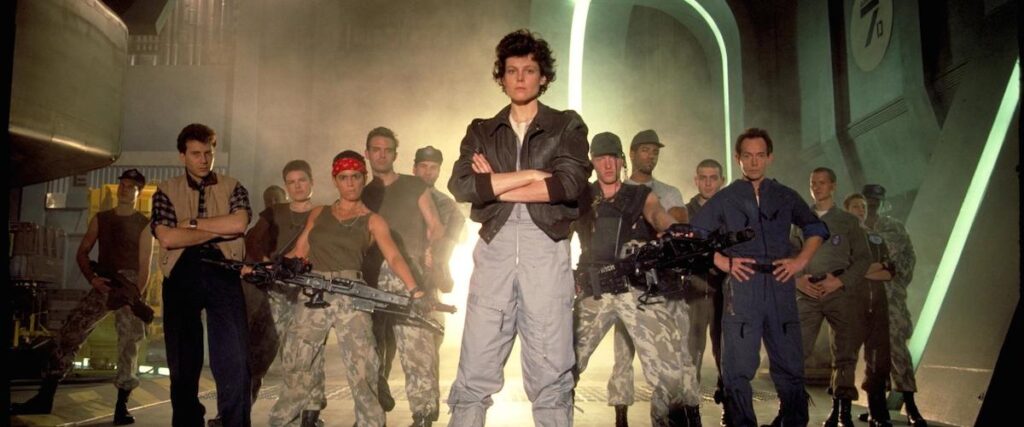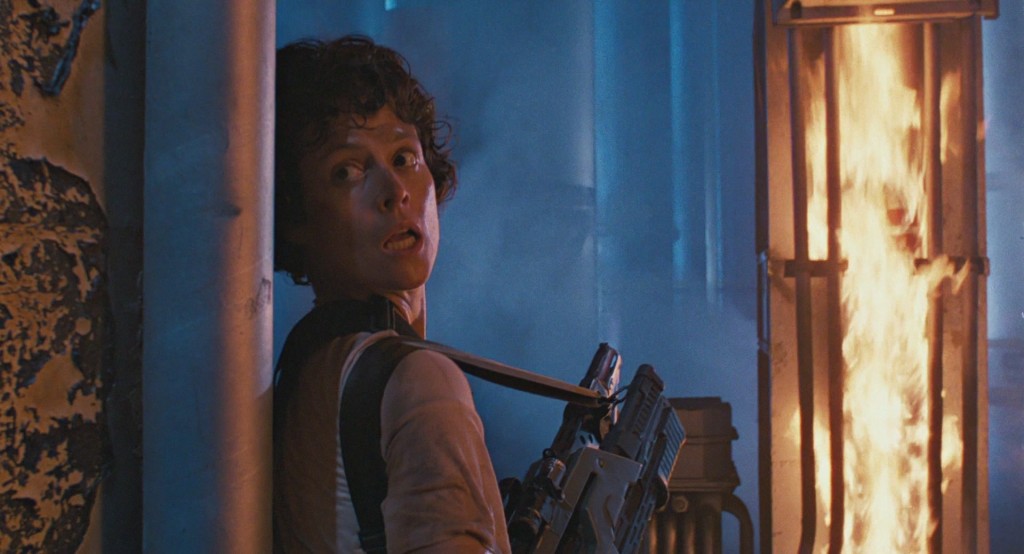Aliens (1986)

DIRECTOR: James Cameron
CAST:
Sigourney Weaver, Michael Biehn, Carrie Henn, Paul Reiser, Lance Henriksen, Bill Paxton, Jenette Goldstein, William Hope, Mark Rolston, Al Matthews
REVIEW:
Aliens, along with James Cameron’s sci-fi hit five years later, 1991’s Terminator 2: Judgment Day , is both among the best sci-fi action thrillers ever made, and a rare example of a sequel surpassing the original. Cameron remains faithful to what Ridley Scott established with 1979’s Alien , but goes further with and expands on both the series mythos and the lead character.
When we start out, we soon find out that Ripley’s (Sigourney Weaver) hope of being picked up in six weeks was a little overly optimistic. Ripley’s escape shuttle has been wandering through space with its sole survivor in hyper-sleep for fifty-seven years, and when she comes to she finds that her superiors are dubious of her story of an alien creature that massacred her crewmates, and learns to her horror that the planet where they stumbled across the alien is now home to a space colony, and the omnipresent Company has just lost contact with them. Reluctantly, Ripley agrees to join an expedition of Marines including Corporal Hicks (Michael Biehn), android Bishop (Lance Henriksen), and also accompanied by company representative Burke (Paul Reiser). Upon their arrival, they discover an orphaned girl called Newt (Carrie Henn), and that they’re in over their heads.
Replacing Ridley Scott in the director’s chair, Cameron maintains a feel of seamless continuity with Alien. Despite the seven year gap between films, Sigourney Weaver looks almost exactly the same. Jonesy the cat makes a brief reappearance. All the ominous musical cues from the first film are retained. We briefly see photographs of Ripley’s former crewmates. The difference, as can be expected with Cameron, is more emphasis on action. There are still some suspenseful scenes (a couple courtesy once again of the ominous motion detectors), and a few moments of horror, but both are less the focus than in Alien. As he would do with Terminator 2, Cameron would use the original installment as the launching pad for a more epic sci-fi action thriller, expanding on the series mythology while adding touches of character development and character bonding.
 Despite gaining an Academy Award nomination here, Sigourney Weaver suffers from some of the same deficiencies that were present in Alien. Her line delivery is occasionally uncertain, and she has a tendency to be overwrought in her most emotional moments. Weaver is at her best in two areas: the emotional connection that develops between the childless Ripley and the motherless Newt, and ass-whooping action heroine mode. When Weaver picks up the big guns and takes control of the power loader for a climactic fight to the death with the huge alien Queen, started off with the crowd-pleasing line ‘get away from her, you bitch!’, it’s the kind of scene we could imagine being performed by Arnold Schwarzenegger or Sylvester Stallone. It’s a rare achievement for an actress to radiate the required toughness and screen presence to stand toe-to-toe with any male action hero who could be named, and it’s that, more than anything else, that explains Ripley’s iconic popularity. Carrie Henn, in her first and only acting appearance, is a little unpolished, but she’s convincingly fearful and and her bonding scenes with Ripley are effective. Michael Biehn has probably his best-known role here after 1984’s The Terminator (probably not coincidentally, both are directed by James Cameron), again doing his sensitive military man thing as the level-headed, collected Hicks. Lance Henriksen lends Bishop the right amount of eeriness to make Ripley—and us—wonder if we can trust him. Paul Reiser is convincing scumbag material; his Burke oozes squirming smarm with every movement and expression. Bill Paxton—who like Biehn is something of a Cameron regular—supplies almost 100% of the limited comic relief (in the first installment, comic relief was virtually nonexistent) as Hudson, who talks a big game but threatens to go to pieces when he finds what he’s up against. The other Marines with the most distinctive personalities are William Hope as Lt. Gorman, who freezes up under pressure, and Jenette Goldstein as the hard-ass Vasquez, the only woman onscreen who threatens to make Ripley look girly.
Despite gaining an Academy Award nomination here, Sigourney Weaver suffers from some of the same deficiencies that were present in Alien. Her line delivery is occasionally uncertain, and she has a tendency to be overwrought in her most emotional moments. Weaver is at her best in two areas: the emotional connection that develops between the childless Ripley and the motherless Newt, and ass-whooping action heroine mode. When Weaver picks up the big guns and takes control of the power loader for a climactic fight to the death with the huge alien Queen, started off with the crowd-pleasing line ‘get away from her, you bitch!’, it’s the kind of scene we could imagine being performed by Arnold Schwarzenegger or Sylvester Stallone. It’s a rare achievement for an actress to radiate the required toughness and screen presence to stand toe-to-toe with any male action hero who could be named, and it’s that, more than anything else, that explains Ripley’s iconic popularity. Carrie Henn, in her first and only acting appearance, is a little unpolished, but she’s convincingly fearful and and her bonding scenes with Ripley are effective. Michael Biehn has probably his best-known role here after 1984’s The Terminator (probably not coincidentally, both are directed by James Cameron), again doing his sensitive military man thing as the level-headed, collected Hicks. Lance Henriksen lends Bishop the right amount of eeriness to make Ripley—and us—wonder if we can trust him. Paul Reiser is convincing scumbag material; his Burke oozes squirming smarm with every movement and expression. Bill Paxton—who like Biehn is something of a Cameron regular—supplies almost 100% of the limited comic relief (in the first installment, comic relief was virtually nonexistent) as Hudson, who talks a big game but threatens to go to pieces when he finds what he’s up against. The other Marines with the most distinctive personalities are William Hope as Lt. Gorman, who freezes up under pressure, and Jenette Goldstein as the hard-ass Vasquez, the only woman onscreen who threatens to make Ripley look girly.
Alien was straightforward horror, with outmatched crew members stalked by a monstrous creature through dark rooms and corridors and picked off one by one. Aliens has shades of the same, but also shades of a war movie. The best scenes, usually harrowing confrontations between the Marines and hordes of aliens, are less about terrifying the audience and more about creating an adrenaline rush, although the latter is helped not only by James Cameron’s excellent sense for directing thrilling action sequences, but also because the aliens are a legitimate menace.
 The movie is also clever in the way it toys with our expectations by echoing some of the plot elements of its predecessor. Ripley’s experience with Ian Holm’s Ash in Alien leads her—and the audience—to view latest android onboard Bishop with suspicion, but perhaps she should be keeping a closer eye on the human Burke. Along the way, there’s more commentary about corporate greed coming before human considerations, and we learn more about the aliens’ social behavior. Alien deliberately kept details about the alien vague and ambiguous, aside from their parasitic reproductive methods, but here Cameron gives them an ant or bee-like hive structure, complete with warriors, thousands of eggs, and a single massive Queen. The aliens also show some cunning and intelligence, with the Queen understanding what it means when Ripley points a flamethrower threateningly at her eggs, and later apparently even being able to work an elevator.
The movie is also clever in the way it toys with our expectations by echoing some of the plot elements of its predecessor. Ripley’s experience with Ian Holm’s Ash in Alien leads her—and the audience—to view latest android onboard Bishop with suspicion, but perhaps she should be keeping a closer eye on the human Burke. Along the way, there’s more commentary about corporate greed coming before human considerations, and we learn more about the aliens’ social behavior. Alien deliberately kept details about the alien vague and ambiguous, aside from their parasitic reproductive methods, but here Cameron gives them an ant or bee-like hive structure, complete with warriors, thousands of eggs, and a single massive Queen. The aliens also show some cunning and intelligence, with the Queen understanding what it means when Ripley points a flamethrower threateningly at her eggs, and later apparently even being able to work an elevator.
Like Terminator 2, what makes Aliens more than just a sci-fi action thriller is the underlying emotional connection between the characters, particularly between Ripley and Newt (there is also some low-key sexual tension between Ripley and Hicks, but it’s wisely kept as undertones; a full-blown romantic subplot would have interrupted the movie’s take-no-prisoners pace). By the climax, we’re not only on the edge of our seats because of the action and tension, but because the characters, especially Ripley and Newt, have come to mean something to us. When Newt is taken by the aliens to their nest, necessitating Ripley’s climactic confrontation with the Queen, it ups the stakes even further in a climax that already approaches the harrowing urgency of Alien. And the climactic battle between Ripley and the Queen is not only human vs. alien, but two mothers pitted against each other in defense of their children. Another chilling scene comes when the aliens nearly outwit the humans to find a way into a barricaded room, and as before, there is the ‘just when you thought it was okay to relax’ final shock.
Despite their differences, Aliens feels very much of a piece with Alien, and in retrospect, this is where the series should have ended. Unfortunately, opportunities to continue milking a franchise for box office profits often supersede creative integrity, but the shortcomings of the following installments do not diminish what Ridley Scott and James Cameron achieved with Alien and Aliens.
***1/2